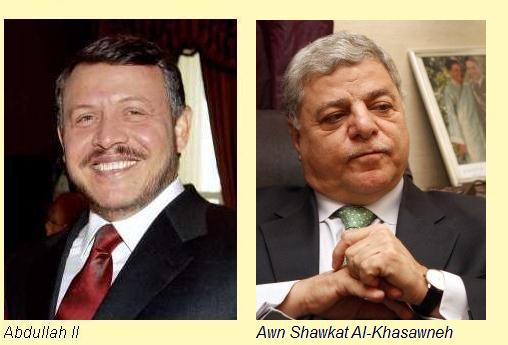
HASHEMITE KINGDOM
OF JORDAN
Official name: Al-Mamlakah al-Urduniyah al-Hashimiyah (Hashemite Kingdom of Jordan)
Location: West Asia
International organisations:The Arab League, The Non-Aligned Movement, The Organisation of Islamic Conference,
The United Nations, The World Trade Organisation
Borders: Iraq, Israel, Palestinian Territories, Saudi Arabia, Syria
Coastline: Gulf of Aqaba
Land area: 92,300 Km2
Population: 6,300,000
Ethnicity: Almost the entire population is of Arab stock. Of these, about 2 million are of Palestinian origin,
another 750,000 are refugees from Iraq who have settled permanently in Jordan, and about 300,000 are Egyptians. There are also
minorities of Arabs from other countries, as well as Chechens, Circassians and Armenians. There is considerable tension
between these populations and the "native" Transjordanians who monopolise government employment.
Languages: Arabic is the official language and is univerally used.
Religion: Sunni Moslem 92%, Christian of various denominations 6%
Form of government: Semi-constitutional monarchy. Jordan is divided into twelve
governorates.

Capital: Amman
Constitution: The
Constitution of the Hashemite Kingdom of Jordan came into effect on 8 January 1952.
Head of state: King Abdullah II succeeded to the throne on 7
February 1999.
Head of government: The Prime Minister, appointed by the King. The
Prime Minister is in theory accountable to the legislature but in practice is
accountable to the King.
Awn Shawkat Al-Khasawneh has been Prime
Minister since 24 October 2011.
Legislature: Jordan has a bicameral legislature, the National Assembly (Majlis al-Umma).
The House of Deputies (Majlis al-Nuwaab) has 110 members, elected for four-year terms from single-member constituencies.
Six seats are reserved for women. The Senate (Majlis al-Aayan) has 40 members appointed by the King, which in effect
gives the King a veto over legislation passed by the lower house. The legislature does not have a website.
Electoral authority: The Ministry of the Interior administers national
elections. The electoral system is rigged in favour of the Transjordanian minority, who are strongly loyal to the
Hashemite dynasty.
• Freedom House 2011 rating: Political Rights 6, Civil Liberties 5
• Transparency International Corruption Index: 33% (87 of 178 countries rated)
• Reporters Without Borders Press Freedom 2010 Index: 78.5% (80 of 178 countries rated)
• Heritage Foundation Economic Freedom 2010 Index: 64% (70 of 179 countries rated)
Political history
The territory which is now Jordan was part of the Ottoman province of Syria before
World War I. It had never been a separate political unit and its people considered
themselves to be Syrian Arabs. During the war the British and French
promised independence to the Arab subjects of the Ottomans if they supported the Allies,
and in 1920 an Arab kingdom was proclaimed in Damascus, headed by the al-Hashemi or
Hashemite family. The Hashemites were hereditary Sharifs of Mecca and had led the Arab revolt against the
Ottomans. The French refused to allow this arrangement, and the British compensated the Hashemites by
installing them as rulers of Iraq, and of the eastern half of Palestine.

This region became a British mandated territory known as the Emirate of Transjordan under Abdullah al-Hashemi in 1921.
It became the Kingdom of Transjordan in 1946 when the British mandate ended, and the
Kingdom of Jordan in 1949. In 1949 Jordan annexed the parts of Palestine on the West Bank of the Jordan not occupied by
Israel. In 1958 Jordan entered a federation with Iraq, but this ended with the overthrow
of the Iraqi monarchy a few months later. In 1967 Jordan's territory on the West Bank was seized by Israel.
Jordan renounced its claim to the West Bank in 1988. In 1994 Jordan recognised Israel and signed a peace treaty.
Abdullah's son Hussein became King in 1952, and under his moderate rule Jordan
became a relatively liberal and well-governed state, with a Constitution providing for
parliamentary government, but in practice Hussein ran the country and no serious
opposition was permitted. The inflamation of the Palestinian issue threatened to
destabilise a country with no real national identity and where a third of the
population is of Palestinian origin. There is considerable tension
between the Palestinian and other minority populations and the "native" Jordanians, who monopolise government employment.
Hussein died in 1999 and his son Abdullah II has inherited these problems.
Political parties were legalised in 1992, and Jordan now has a number of parties, of which the Islamic Action Front, a
branch of the Moslem Brotherhood, is the most important. Although reasonably free elections were held in 2003 and 2007,
the legislature has little real power and is dominated by
"independent" members who support the government. Given the weakness of the party system and
the continuing domination of the King over political life, Jordan cannot be considered a
genuine democracy.
Freedom House's 2011
report on Jordan
says: "Jordan is not an electoral democracy. King Abdullah II holds broad executive powers, appoints and dismisses the
prime minister and cabinet, and may dissolve the National Assembly at his discretion...
The 2010 election law added 10 seats to the Chamber of Deputies, for a new total of 120. Four of the new seats
represent urban districts, where most Jordanians of Palestinian origin reside. Nevertheless, the parliament remains
heavily imbalanced in favor of rural districts, whose residents are generally of Transjordanian origin...
The new election law retains a voting system in which voters must choose a single candidate in what are generally
multiseat districts. Reformers have long called for a move toward proportional representation, arguing that the
existing system encourages voting based on tribal ties rather than political and ideological affiliation...
The security forces, whose leadership generally excludes Jordanians of Palestinian descent, continue to exercise
significant influence over Jordanian political life by limiting citizens' freedoms of speech and assembly...
Efforts to combat corruption in recent years have yielded mixed results...
Freedom of expression is restricted, and those who violate redlines regarding the royal family and certain societal
taboos face arrest... Most broadcast news outlets remain under state control, but satellite dishes give residents
access to foreign media. While there are dozens of private newspapers and magazines, the government has broad powers to
close them... Freedom of assembly is heavily restricted... The judiciary is subject to executive influence through the
Justice Ministry and the Higher Judiciary Council, most of whose members are appointed by the king...
Women enjoy equal political rights but face legal discrimination in matters involving inheritance, divorce, and child
custody, which fall under the jurisdiction of Sharia (Islamic law) courts."
Updated November 2011
|

